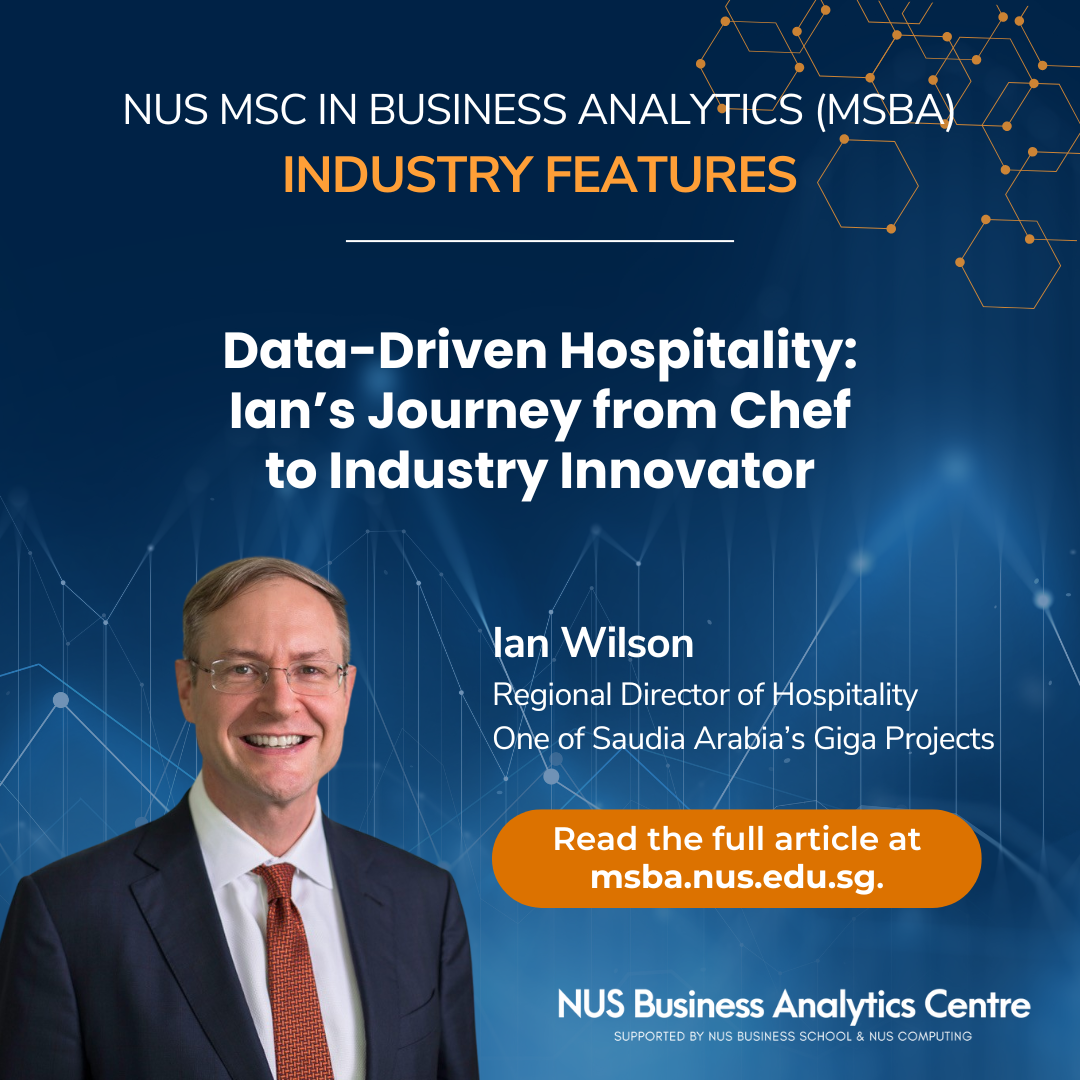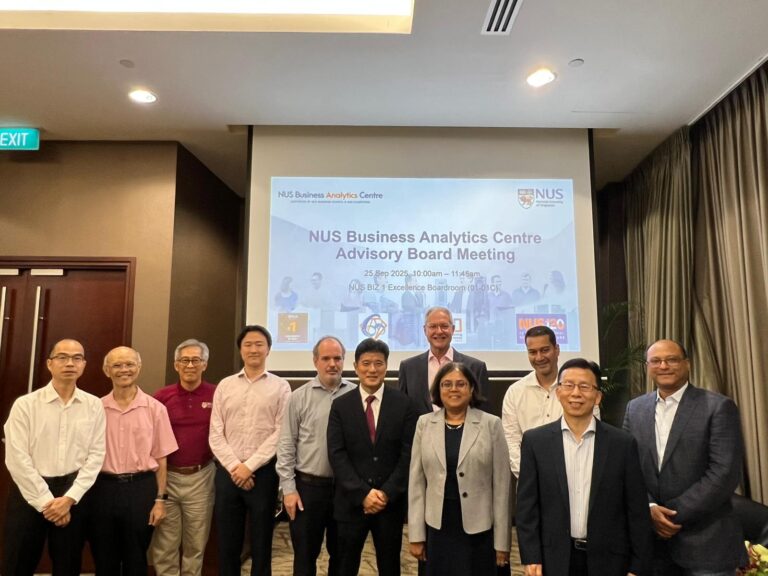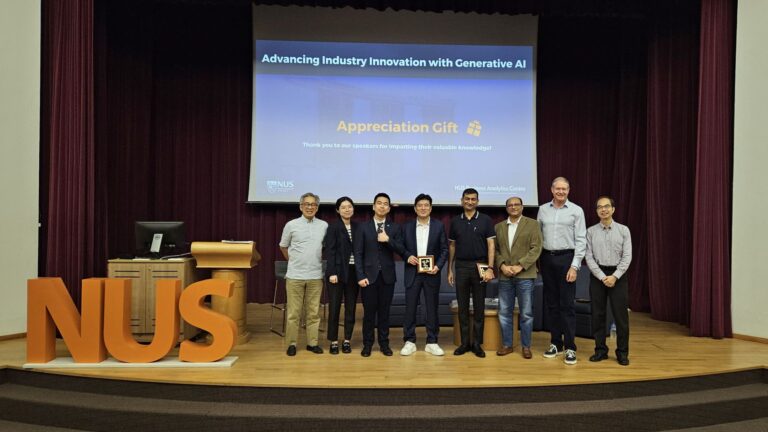From cooking in Michelin-starred kitchens to leading hospitality innovation on a global stage, Ian Wilson’s career is a story of both personal and industry-wide transformation. Today, as Regional Director of Hospitality at one of Saudi Arabia’s giga projects and Chairman of the NUS Business Analytics Centre (BAC) Advisory Board, Ian continues to champion the power of data-driven approaches to reimagine service industries.

From Dining Rooms and Kitchens to Global Leadership
Ian’s career began in the dining rooms of the Canadian Rockies, with formative roles at the Banff Springs Hotel and a Michelin-starred restaurant in France. Realising that practical experience alone was not enough, Ian returned to Cornell University to deepen his expertise in the business side of hospitality, earning both a bachelor’s and master’s degree to learn more about finance, marketing, and real estate.
After completing his studies at Cornell University, he transitioned into hotel management with Canadian Pacific and Fairmont Hotels, where he introduced analytical approaches to revenue management and helped scale the Fairmont brand across Asia.
A defining chapter came with his move to Singapore, a place he had long dreamed of since childhood. “Growing up, my mom had a poster of the Raffles Hotel in our summer cottage, and I always imagined what this amazing, exotic place must be like.” At Marina Bay Sands, Ian built a data-driven operations team that transformed performance and earned the Singapore Quality Award, proving how analytics could revolutionise hospitality.
His influence extended beyond the private sector as well, having served as a Technical Advisor to the Singapore Tourism Board, where his expertise shaped national tourism strategies and affirm his standing as a respected leader in hospitality business analytics.
Reimagining Hospitality with Analytics
Ian believes hotels hold untapped potential when it comes to data. “Hotels are incredibly complex environments with vast amounts of data, but they haven’t leveraged it effectively. The hotel of the future will operate more like a digital business, where you measure, experiment, and continuously improve.”
He has often used analytics to challenge “sacred cows” of the industry, long-held assumptions about guest behaviour and operations that data ultimately proved false. For instance, practices once thought essential to guest satisfaction were shown to have minimal impact, allowing management to redirect resources toward what truly mattered. By grounding decisions in data rather than tradition, Ian helped shift hospitality from intuition-driven management to performance-driven innovation.
Analytics, he explains, not only identifies inefficiencies but also deepens understanding of the customer journey. Hotels can predict guest preferences, personalise experiences, and even anticipate needs before they are expressed. “With the right data, you stop guessing what guests value — you know.”
For Ian, analytics also empowers every level of staff by making contributions visible. With transparent metrics, hotels can align teams from top to bottom, foster a coaching culture, and focus on the 20% of actions that drive 80% of results. Looking ahead, he sees AI and robotics playing a supportive role: “It’s about taking the robot out of the human,” he says, automating repetitive tasks so people can focus on delivering the personal service that defines hospitality.

Leading the BAC Advisory Board
Ian describes his appointment to the BAC Advisory Board as both a surprise and an honour. “I’m not a pure technologist, I come from operations and have seen how data can transform it. But I’m a fervent believer in the NUS MSBA programme. I hired many NUS MSBA interns and graduates, and they truly helped me transform my business and think differently about how the industry can work.”
Now, as Chairman, he sees his role as both giving back and helping to shape the programme’s future. He is especially proud of its global recognition, “Being in the top 10 in the world1 and number one in Asia2 makes me beam with pride, but I think we can aim even higher!”
The Strength of the NUS MSBA
What distinguishes the NUS Master of Science in Business Analytics (MSBA) programme, Ian believes, is its tight link between industry and academia. Capstone projects, applied learning, and faculty engagement create a continuous cycle of improvement. “Students don’t just learn concepts; they apply them immediately in real-world contexts. I’ve seen NUS MSBA graduates add value from day zero in their capstone projects.”
He also highlights the programme’s strengths in inspiring faculty, its forward-looking curriculum, and its manageable 14-months structure. “It’s long enough to gain depth, but short enough to re-enter the industry quickly. Students graduate with a portfolio of tangible accomplishments that make them stand out.”
Above all, Ian emphasises the calibre of the students themselves. “They impress me with their curiosity, capability, and drive. They’re not just technically skilled, they know how to ask the right questions and use data to create real business value.”

The Future of Analytics and AI
Looking ahead, Ian predicts that analytics and AI will transform service industries much as manufacturing and digital businesses. Hotels will evolve from reactive firefighting to predictive, experiment-driven operations. “If we don’t innovate, we risk losing the magic of hospitality and reducing it to a commodity. But if we harness analytics and AI wisely, we can make hospitality more productive, more rewarding for employees, and more meaningful for guests.”
Advice for Aspiring Professionals
For aspiring analytics and AI professionals considering the NUS MSBA, Ian offers the following advice:
“The future belongs to those who stay ahead of change. If you remain open to learning and willing to experiment, you’ll be ready to lead — in hospitality, analytics, or any industry you choose.”
___________________________
1: Based on QS Business Master’s Ranking: Business Analytics 2024
2: Based on QS Business Master’s Ranking: Business Analytics 2021-2026
© National University of Singapore. All Rights Reserved.